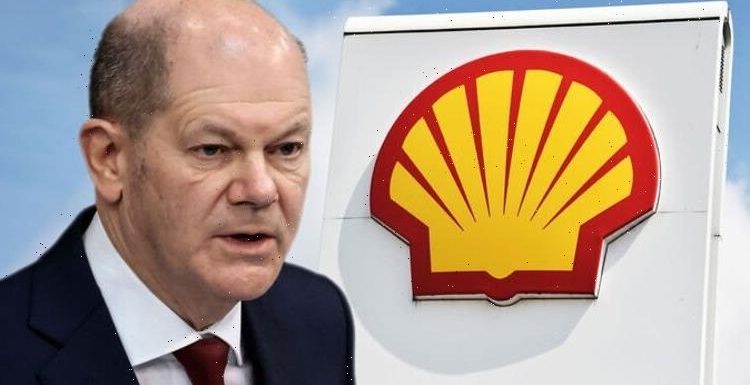
Scholz imposes sanctions covering the Nord Stream 2 gas pipeline
We use your sign-up to provide content in ways you’ve consented to and to improve our understanding of you. This may include adverts from us and 3rd parties based on our understanding. You can unsubscribe at any time. More info
The German Chancellor pledged not to certify Nord Stream 2, the pipeline that would send Russian gas to Germany bypassing Ukraine and Poland through the Baltic Sea. The move was an attempt to sanction Russia amid the soaring pressure it put on Ukraine which has now developed into a “full-scale invasion”. But this could be bad news for Shell, which is thought to have invested £750million into the pipeline according to some estimates.
The oil giant was one of five Western energy companies which bankrolled 10 percent of the construction cost for the £8billion pipeline.
The other half was funded by Russia’s state-owned gas giant, Gazprom.
Biraj Borkhataria, from RBC Capital Markets, said: “I believe Shell’s exposure is around $1 billion (£750million) and, given the circumstances, I would expect to write it down, unless it is able to recover the funds or receive compensation.”
Mr Scholz had come under intense pressure to cancel Nord Stream 2 as Mr Putin mounted pressure on Ukraine with his build-up of nearly 200,000 troops at the country’s borders.
The US was long opposed to the project and had urged Germany to cancel it.


The Biden administration argued this would give the West “leverage” over Russia and help to discourage an invasion,
But it took the new German Chancellor a number of weeks to explicitly state whether this would be a part of the “massive sanctions” threatened by the West.
Now that Mr Scholz has agreed to put the project on ice, the money Shell invested is at risk of disappearing if the project never comes into action.
Wintershall, another company which bankrolled part of the construction for Nord Stream 2, disclosed that it had spent €730 million (£610 million) on the pipeline.
While Shell has not yet disclosed the amount it contributed, it could be implied that it spent the same or a similar amount to Wintershall.

The pipeline was yet to come online and already had its approval suspended by German regulators prior to Mr Scholz’s announcement.
Russia claimed the 750-mile pipeline would have doubled Russia’s gas exports to Germany and eased prices, which have reached record highs in recent months amid a European energy crisis.
But critics of the pipeline say Nord Stream 2 would have made the EU more dependant on Russia, which Mr Putin could use as a geopolitical weapon.
Yuriy Vitrenko CEO of Ukraine gas giant Naftogaz, had lobbied hard for the US, Germany and the EU to slap sanctions down on Nord Stream 2.
He commented on Mr Scholz’s decision to halt the pipeline: “We welcome the decision of the German Federal Ministry of Economic Affairs and Climate Action to withdraw the official assessment that Nord Stream 2 has no impact on security of gas supply in Germany.
DON’T MISS
Archaeologists puzzled how Cerne Abbas Giant ‘clue’ was missed [REPORT]
Russia missile warning as RAF fears UK’s warning systems thwarted [REVEAL]
Putin’s plan to STARVE Britons backfires as backup stocks built up [INSIGHT]


“We hope that the Federal Ministry will submit a new conclusion, which will clearly state that Nord Stream 2 poses a threat to such security.
“This will be the basis for the regulator to reject certification for this gas pipeline. Naftogaz provided the relevant arguments to the German government.
This demonstrates that Germany stands in solidarity with Ukraine, in particular, supporting our position on Nord Stream 2, which we have been communicating to the new government in recent months.
“The last time we did this was a few days ago during the Munich Security Conference in the context of the looming escalation of Russian military aggression.
“Putin’s revisionist imperial policy poses a threat to Ukraine, Europe and the whole world. Nord Stream 2 is one of the elements of this policy and therefore requires an adequate response.”
Source: Read Full Article